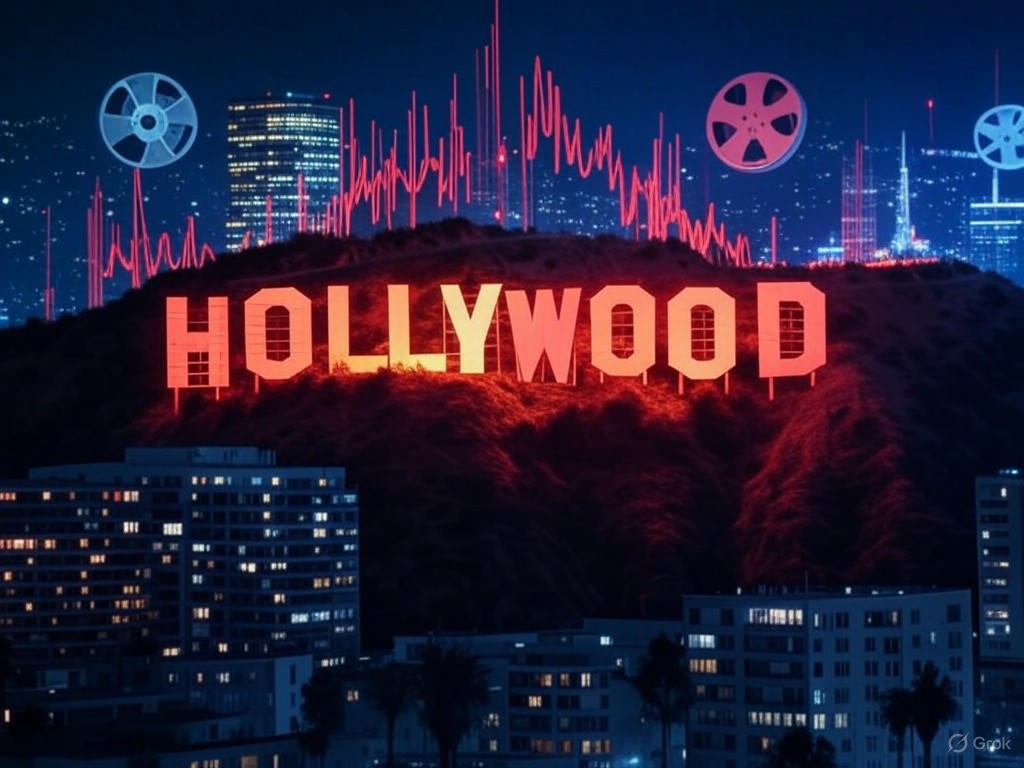
Trump Tariffs Shake Up Entertainment Stocks Significantly
Trump’s Foreign Film Tariff Proposal Rattles Entertainment Industry
Imagine waking up to headlines that could reshape an entire industry overnight— that’s exactly what happened on Monday, May 5, 2025, when President Trump’s proposal for 100% tariffs on foreign-made films hit the news. Trump movie tariffs instantly sparked chaos in the stock market, with companies like Lionsgate Studios, Netflix, and Paramount seeing sharp drops as investors scrambled to assess the fallout. This move underscores the tension between global filmmaking and “America First” policies, leaving the entertainment sector on edge.
While the initial panic led to significant volatility, some stocks began to rebound later that day after the White House clarified that the plan wasn’t finalized. It’s a reminder of how interconnected trade policies are with creative industries, where international collaborations are the norm. If you’re tracking your investments, this event highlights why keeping an eye on policy shifts is crucial—after all, what affects Hollywood can ripple through your portfolio.
The Immediate Impact of Trump Movie Tariffs on Entertainment Stocks
The market didn’t waste time reacting to the Trump movie tariffs announcement, with entertainment stocks experiencing rapid swings right from the opening bell. By midday, the fallout was clear, though not every company suffered equally—resilience varied based on their international exposure. This kind of volatility isn’t just numbers on a screen; it reflects real concerns about how these tariffs could disrupt global production pipelines.
Here’s a quick breakdown of how key players fared during the turmoil:
| Company | Early Trading Impact | Afternoon Position |
|---|---|---|
| Lionsgate Studios | Significant decline | Down 5.8% |
| Netflix | Moderate decline | Down 1.3% |
| Paramount | Slight decline | Down 0.9% |
| Disney | Down 3% at open | Recovered to small gain |
| Warner Bros. Discovery | Initial losses | Down approximately 0.6% |
Investors seemed to adopt a wait-and-see stance, betting that the proposal might evolve or even fade away. Have you ever wondered how quickly external policies can turn your favorite stocks upside down? This scenario shows why diversification and staying informed are your best defenses in uncertain times.
Why Trump Movie Tariffs Could Reshape Filmmaking Forever
President Trump’s rationale for these tariffs stems from his view that foreign incentives are luring U.S. film production abroad, framing it as both an economic and national security issue. In a fiery Truth Social post, he described the situation as a “fast death” for American cinema, pushing for 100% levies on films made overseas. This proposal isn’t just about trade; it’s about protecting jobs and cultural influence at home.
Breaking Down the President’s Case
Trump’s argument paints foreign incentives as a threat, suggesting they undermine domestic studios and even serve as tools for propaganda. He called on key officials to enforce these measures, but the devil is in the details—exactly which films qualify as “foreign-made” remains murky. For instance, think about a blockbuster shot in multiple countries; how do you slap a tariff on that? It’s a question that’s got experts debating late into the night.
This approach echoes past trade spats, where culture and commerce collide. If enacted, Trump movie tariffs might force studios to rethink their strategies, potentially boosting U.S.-based production and creating more local jobs.
The Global Filmmaking Puzzle and Tariff Complications
Today’s film industry is a global web, with productions spanning continents for tax breaks, talent, and locations. Trump movie tariffs could throw a wrench into this system, making it tougher to film abroad without hefty penalties. Modern hits often start with pre-production in one spot, shoot across borders, and wrap up with effects teams worldwide—it’s all interconnected.
This complexity raises practical headaches, like defining a film’s origin. For example, what if a U.S. studio co-produces with a foreign partner? It might lead to innovative workarounds, such as shifting more operations stateside. Here’s a rundown of common global incentives that could be affected:
- Canada’s up to 35% tax credits on production costs, drawing big-budget films away from Hollywood.
- The U.K.’s 25% rebates, which have hosted everything from superhero epics to indie darlings.
- New Zealand’s 20% plus bonuses, famous for franchises like “The Lord of the Rings.”
- Even U.S. states like Georgia offer 30% credits, showing how domestic alternatives might thrive under these tariffs.
With the industry already dealing with post-strike recovery and streaming shifts, adding tariffs could escalate costs. What if your next favorite show ends up more expensive because of this? It’s a scenario worth considering for anyone in the business.
Legal Hurdles Facing Trump’s Tariff Plans
Implementing these tariffs isn’t as straightforward as announcing them; international agreements and U.S. laws could stand in the way. The World Trade Organization and free trade pacts might view this as discriminatory, sparking legal battles. Plus, First Amendment issues could arise if tariffs limit access to diverse content.
Key Challenges Ahead
Enforcement is another beast—how do you tariff a streamed movie that’s digitally distributed? It could open the door to retaliatory actions from other countries, affecting U.S. exports. As an investor or fan, you might ask: Could this ultimately hurt American storytelling by reducing global collaboration? Studios are already brainstorming adaptations, like ramping up domestic shoots or lobbying for exemptions.
Historical Echoes and Cultural Debates
Trade wars over culture aren’t new; France has long fought for protections on its films and media. Trump’s proposal fits into this narrative, questioning whether entertainment should be shielded like other exports. It’s a debate that’s simmered through agreements like NAFTA and the WTO, highlighting how films shape national identity.
Did you know that quotas in Europe have preserved local cinemas for years? If Trump movie tariffs take hold, we might see a similar pushback, balancing economic gains with cultural exchange.
How the Industry Might Adapt to These Changes
Entertainment giants are no strangers to pivots, and these tariffs could accelerate that. Companies with heavy international ties, like Lionsgate, might face bigger hits, while others diversify to minimize risks. Practical steps could include boosting U.S. production hubs or renegotiating deals to keep more work local.
Actionable advice: If you’re in the industry, consider auditing your global partnerships now. For investors, diversifying into less volatile sectors might be smart. What are your thoughts—could this lead to a renaissance in American filmmaking?
Economic and Cultural Ripples from the Tariffs
Beyond stocks, these tariffs could reshape the economy by creating domestic jobs but raising consumer costs. The film sector pumps billions into the U.S., from direct employment to exports, yet globalization has made it vulnerable. On the cultural side, limiting foreign films might narrow perspectives, affecting everything from blockbusters to art-house gems.
Potential outcomes include higher ticket prices or fewer international co-productions. It’s a trade-off: protecting homegrown talent versus fostering a vibrant, global exchange.
What’s Next in the Tariff Saga?
As details unfold, watch for formal policies, industry pushback, and global reactions. The White House’s vagueness leaves room for negotiation, which could ease market jitters. Staying updated is key—sign up for alerts or follow reliable sources to navigate this uncertainty.
In the meantime, companies with flexible models seem poised to adapt best.
Conclusion: Navigating the Uncertainty
In the end, Trump movie tariffs have injected fresh uncertainty into an already dynamic industry, but the story isn’t over yet. While legal and practical barriers might temper the impact, it’s a wake-up call for everyone involved. What steps can you take today to safeguard your interests, whether as an investor or a film enthusiast?
Share your insights in the comments below, explore our related posts on trade policies, or subscribe for more updates. Let’s keep the conversation going—your thoughts could spark the next big idea.
References
For this article, we drew from reliable sources to ensure accuracy:
- Axios. (2025). “Trump’s movie tariffs roil entertainment stocks.” https://www.axios.com/2025/05/05/trump-movie-tariffs-entertainment-stocks
- Best of AI. (n.d.). “All Articles.” https://bestofai.com/allArticles
- Columbia Law School. (n.d.). “Faculty Scholarship Digest.” https://www.law.columbia.edu/faculty-scholarship/faculty-scholarship-digest
Trump movie tariffs, entertainment stocks, foreign film tariffs, Hollywood economy, film industry impact, stock volatility, tariff on movies, Trump trade policies, Hollywood stocks, global filmmaking impact







